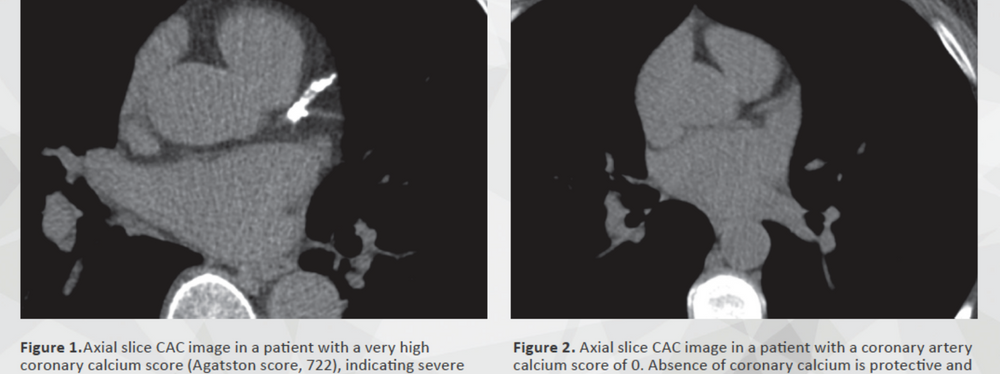What You Need to Know About Coronary Calcium Scans

Sometimes, deciding whether someone should be on statins (medications like Lipitor® and Crestor®) is very clear. If a patient has documented heart disease, diabetes, or a genetically driven very high cholesterol number, placing them on a statin makes a lot of sense. Not because statins make cholesterol numbers look better, but because under those circumstances statins have been shown over and over again to reduce the risk of subsequent heart events.
But many people without known heart disease, diabetes or genetically driven very high cholesterol numbers are advised to take cholesterol lowering drugs. If that describes you, you might just benefit from a coronary calcium scan to determine if you really need those medications.
Here are a few things you should know before you talk to your doctor about getting this type of evaluation:
What is it, exactly?
A coronary calcium scan is a CT scan of your heart. During the scan, around 50 parallel slices of your chest are obtained by the CT scanner, enabling us to “see” whether calcium is building up in your heart arteries. While calcium itself is not dangerous, it likes to hang out with plaque deposits. And plaque is bad news for your heart. Doctors scan for calcium deposits in heart arteries because they’re really easy to detect with a CT scan (they look bright white, while the heart itself looks grey), and because calcium usually starts to accumulate way before significant blockages develop. So coronary calcium scans are great for detecting coronary artery disease very early – way before a stress test would signal a problem.
When you have a coronary calcium test, a computer program analyzes the images obtained during the scan and comes up with a “calcium score”. The more calcium has deposited in your arteries, the higher your score. As we get older, the chance that some calcium is detected goes up and based upon hundreds of thousands of patients who have had this test done, we know what score to expect given your age and gender.
Why does calcium deposit in arteries in the first place?
When plaque develops, it doesn’t accumulate in your arteries evenly. Rather it accumulates in lumps and bumps. That’s why someone can have a 90% blockage that can be fixed with one small stent. That 90% obstruction does not involve the whole heart artery – just one localized spot.
When lumps and bumps develop in your artery walls, they distort the underlying artery wall architecture creating weak points. The body recognizes these areas of vulnerability and tries to reinforce them by building permanent scaffolding. That scaffolding is made out of calcium.
Scaffolding makes the plaque deposits more sturdy - less likely to break down and cause out of the blue events like heart attacks and strokes. So calcified plaque is "stable" plaque. It’s the body's attempt to heal itself.
But we know that wherever there is calcified plaque, there is also uncalcified, less stable plaque. So the calcium deposits are not the real problem. They’re just the marker of the problem. And, typically, the more calcified plaque there is, the more uncalcified plaque is present. Our prevention efforts are actually all aimed at uncalcified plaque, which can be significantly diminished with intensive prevention efforts.
Going for zero - or at least single digits
Back to the calcium score. It’s probably the only time in your life you want to be a zero. A zero score means that no calcified plaque was identified and (based upon multiple studies) that your risk of having a heart attack, or needing a stent or bypass surgery is extremely low -- now, and for the next few years. So low, in fact, that putting you on a statin would be unlikely to make that risk any lower, even if the drug made your cholesterol numbers look better.
Recently, a large analysis showed that calcium scores under 10 are also associated with very low risk in men over age 55 and and women over age 60. So another group that could potentially avoid statin drugs (at least for several years).
What if your score is not a zero, and especially if it's over 10?
First, don’t freak out. Any calcium that is detected did not build up overnight. It takes months to years for calcium to deposit, so think of it more as a report card on your heart's health up until now.
Second, remember that calcium becomes more common as we get older. So the score still has to be put in context of your age and gender.
Finally, look at this as an opportunity to change the trajectory of a health issue that was silently lurking within. Remember, uncalcified plaque can be reversed. To accomplish this may mean taking statins for lowering your cholesterol as well as being very aggressive in addressing any other risk factors that you have. In some individuals, a high score indicates that additional lab testing makes sense - to evaluate lipoprotein A levels, for example. Your doctor may also recommend a stress test, especially if your score is over 100.
The highest score I've ever seen? 2217.
But even at 2217 an abnormal coronary calcium report is NOT an emergency. Again, calcium does not build up overnight. Your non-zero calcium score would have been very similar six months or even a year ago. More than anything, the calcium score provides a very useful benchmark to evaluate your personal heart disease risk.
More points to consider:
- Taking calcium supplements does not affect or cause coronary calcium deposits. Calcium in the blood has nothing to do with calcium in artery walls.
- Calcium in arteries does not go away. So once coronary calcium has been detected, especially if the score is higher than expected for your age/gender, there is usually no reason to repeat the coronary calcium test.
- A coronary calcium scan is NOT an angiogram. It only looks at how much calcium is in your heart arteries. It cannot tell you if a significant narrowing is present. A stress test is a better indicator of that.
- If you’ve already had a heart attack, stent or bypass surgery, a coronary calcium scan is of no value – we already know you have atherosclerosis and you need to be treated aggressively.
- If you have diabetes or a genetically driven very high cholesterol level, you typically don't benefit much from this evaluation - we already know you are high risk.
- Since the buildup of calcium is such a slow process, if you have a zero or very low score you don’t need to take this test more than once every three to five years.
- Coronary calcium scans are considered preventative, so they may not always be covered by insurance. Chances are higher that the procedure will be covered if you are referred by a physician. If you are paying out of pocket for the test, you can expect a bill for around $100.
- Although you can direct yourself for this test without a physician’s referral, I don’t recommend this approach as you’ll need a health care provider to help you navigate the results. A coronary calcium scan is only one piece of information about your risk for heart disease and needs to be considered in the context of your overall prevention plan.
- Finally, a low or zero score is never a free pass to ignore your health. Continue your healthy habits: exercising, living a smoke-free life, and - of course!! - eating well.
Whether a patient comes to me with a score of zero or 1700, my first recommendation is to eat a healthy diet, because food has such profound effects on our heart and vascular system. I started Step One Foods to make healthy eating easier for my patients, packing each product with as much whole food fiber, plant sterols, and omega 3 fatty acids as possible. Because it's these types of nutrients that ensure the healthiest arteries possible.
Try Step One Foods today!
Each non-pharmaceutical dose of Step One Foods targets the root cause of high cholesterol for proven reduction without major lifestyle changes. Choose Step One Foods twice each day as a meal or snack for lower cholesterol in as little as 30 days.

Tested & Proven Results.
- Cardiologist formulated
- Supported by over 500 publications
- Clinically-proven, in a double-blind randomized trial with Mayo Clinic and The University of Manitoba
80% of participants lowered their cholesterol in just 30 days. With just two servings per day, Step One Foods offers a proven-effective way to naturally lower LDL (bad) cholesterol.
Get heart health tips and articles like this, delivered right to your email.
New articles every week.
You may also like...

The Clock You Should Be Paying Attention To (But Probably Aren’t)

The LDL Chart Fueling Confusion Online - And What It Misses

You don’t need to avoid foods with cholesterol…except for these


